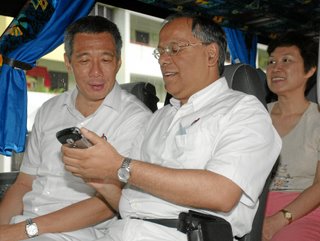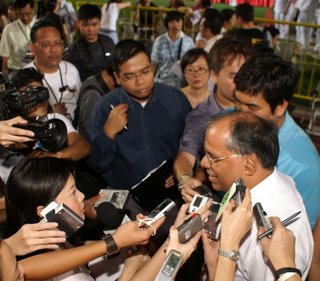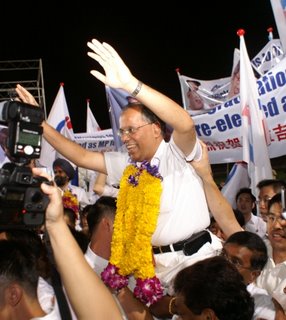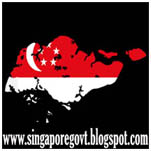Super Seven (minus one): Report Card of Ministers
Your votes have spoken! This is the first part of the “Super Seven” Ministers article. I have to apologize for taking such a long time with my articles. For the past few days, I have been away experiencing politics, Tom Yum style. Nonetheless, here is the article and hope that it is a useful and interesting read.
After each election, some of the new candidates will be thrown into the political office. In the recent GE, Grace Fu, Lui Tuck Yew and Lee Yi Shyan were the ones who became Ministers of State. In the 2001 General Election, seven were promoted to Senior Ministers of State and Ministers of State. They are, Tharman Shanmuguratnam, Dr Vivian Balakrishnan, Dr Ng Eng Hen, Raymond Lim, Dr Balaji Sadasivan, Khaw Boon Wan and Cedric Foo. With the exception of Cedric Foo, who quit political office during the term, the rest of Super-seven made quite good progress. The first part will feature two of the six Ministers, Tharman and Dr Balaji.
In the past Cabinets, Singapore has seen several great Ministers who are Indians, such as the late S. Rajaratnam (DPM, SM and Foreign Minister), ex-Foreign Minister Dhanabalan and DPM Jayakumar. Following the footsteps of these giants are Tharman and Dr Balaji. Five years has passed and let’s see the major issues surrounding these Ministers.
Tharman Shanmugaratnam
Current Portfolio:
Minister for Education (MOE)
Second Minister for Finance (MOF)
Deputy Chairman of Monetary Authority of Singapore (MAS)
Previous Portfolios:
Senior Minister of State for MTI & MOE (Nov 2001 to July 2003
Acting Minister for Education (Aug 2003 to Aug 2004)
Previous Vocation:
Managing Director of MAS
Major Policies Introduced:
Reforms to Education System (Less Streaming, More Fuzziness)
Amendment to “Bilingualism Policies”
Promotion of Singapore as an Education Hub
Increase Number of Universities in Singapore
Promotion of Co-Curricular Activities in Schools
Social-Emotional Learning in Schools
Launching of Singapore Management University
Corporatisation of NUS & NTU
Life-sciences Education Programme
Bicultural Studies Programme
Compulsory Education Act
“Sticky” Point:
Ironically, his “stickiest” point was not during his time in politics but outside. December 1992, he was one of the five charged under the Official Secrets Act. The charges follow a 29 June 1992 Business Times article, headlined “2nd qtr: Flash estimates point to below 5pc growth” and written by correspondent Anna Teo, which said the early indications were of second-quarter growth of 4.6 to 4.8 per cent. The government later announced a growth figure of 4.7 per cent for the quarter. Tharman was charged with unlawfully communicating the flash estimate of 4.6 per cent given to him in confidence by the Department of Statistics to Mr Bhaskaran who faces three charges - receiving the information, and passing it on to Raymond Foo and BT senior correspondent Kenneth James.
The case lasted almost 16 months until March 1994 when the verdict was out. According to the AFP article dated 31 March 1994:
“The defendants are Business Times editor Patrick Daniel, 39, its technology editor Kenneth James, 46, Monetary Authority of Singapore (MAS) director Tharman Shanmugaratnam, 36, and Crosby Securities economists Manu Bhaskaran, 36, and Raymond Foo, 29.
The prosecution claimed Crosby's Bhaskaran saw the secret estimate in a MAS report that Shanmugaratnam carried for reference during a meeting with him on June 19, 1992.
Bhaskaran is accused of passing the estimate to his colleague Foo and to James at the Business Times.
MAS's Shanmugaratnam is charged with handling secret information in a way that endangered its secrecy. Bhaskaran, Foo, Daniel and James are charged with obtaining the classified estimate from a government source and communicating it. All five have denied the charges.”
On 31 March 1994, the verdict was out. Since the court had found “it was open to the prosecution not to accept the court's finding of no communication, but having given its consent and drafted an amended charge, it has accepted the court's finding of no communication by Shanmugaratnam to Bhaskaran”. Thus, Tharman was only fined S$1,500 (US$955) on one charge of handling secret information in such a way as to endanger its secrecy.
This incident was the talking point of the 2001 General Elections, but had no effect on the electorates at Jurong GRC. Tharman and the PAP team resoundingly defeated SDP (led by Chee Soon Juan) garnering 79.75% of the votes. It must be said that this OSA incident did traumatized him somewhat. However, he has recovered well from it and did a reasonably good job in a very unpopular Ministry (of Education). If you are interested in the full media reports of Tharman’s OSA cases, let me know via email.
Media Image:
In the media, he was always seen as the cool, calm and collected Minister. Articulated in words and responded well in dialogues and interviews. Comparatively to other new Ministers, he has gotten one of the most media spotlight.
Final Note:
Tharman meteoric rise is quite counter-intuitive. 14 years ago, he was involved in a highly-publicized criminal case and now, he is the Second Finance Minister. For people who are closed to him, would not have found it surprising. He is quite the same person as he is behind the scenes to in front of the media. He is eloquent, deep and methodical thinker, cool in the face of storm and well-liked by his followers.
Having taken over a “much-hated” Ministry, the Ministry of Education, Tharman has done quite a fair job in gradually removing the detested streaming system. To many, it seemed like a simple task for a Minister to direct the change but this is not the case in reality. While most might find it a necessary move to remove the streaming system, executing the change and not letting the public perceiving that it was a policy-gone-wrong is no simple feat. To execute it, he has to be careful not to be seen as correcting the ex-Education Ministers’ (some of them are still in Cabinet) policies. To add to the challenge, Singaporean parents are one of the world’s most difficult to satisfy bunch of people.
Despite these challenges, he has done a smooth job with relatively less troubles. I think there is room for progress for Tharman and he might take on more heavy-weight portfolios in the coming future.
Dr Balaji Sadasivan
Current Portfolio:
 Senior Minister of State for Foreign Affairs (MFA), Information, Communication and the Arts (MICA) Chairman of Committee on Ageing Issues (CAI)
Senior Minister of State for Foreign Affairs (MFA), Information, Communication and the Arts (MICA) Chairman of Committee on Ageing Issues (CAI)Chairman of Service Improvement Unit (SIU)
Previous Portfolios:
Minister of State for Transport (Nov 2001 to August 2004)
Minister of State for Health (Nov 2001 to August 2004)
Minister of State for Environment (Nov 2001 to May 2003)
Senior Minister of State for Health (August 2004 to May 2006)
Previous Vocation:
Neurosurgeon, with external Law Degree
Before entering politics, he was the top neurosurgeon in Singapore and the only one that is recognized by the USA and Australian neuroscience boards. As full neurosurgeon in Singapore, he handles only the most serious brain surgeries but has a 100% success rate in operations.

When he was in Michigan, he was the neurosurgeon who extracts brain tissues (which has the most concentration of HIV virus) of HIV patients. Out of leisure, he also has a law degree. Unknown to many, he was a very successful entrepreneur as well. He had company that made medical surgery machines based on the global positioning to help the surgeon to make the incisions. Just when the company was about to take off and earn him millions in profit, he closed his businesses (he did not transfer it to any relatives) when became a Minister (as required by law). The pay he receives as a Minister is far less than what he earns as a neurosurgeon and director of the companies.
Major Policies Introduced:
 General Election Campaigning (Podcasting and Internet Activities)
General Election Campaigning (Podcasting and Internet Activities)Curbing the Hand, Foot and Mouth Disease
Biological Agents and Toxin Bill
Entry into World Health Organization (WHO) Executive Member Board
Curbing Dengue Fever, Aedes Mosquitoes
Curbing Stroke Cases
Amendment to Telecommunications Act
Amendment to Broadcasting Act
Amendment to Electronic Transaction Act
Amendment to Maritime Offence Act
Amendment to Infectious Disease Act
HIV-AIDS Public Education Campaign
Bird-flu Prevention Campaign, and representative to WHO
Human Cloning and Other Prohibited Practices Act
Security at MRT Stations
Policies for Aging Population
Eldershield Care
Reduction in Cost of Ez-link Cards
“Sticky” Point:
Perhaps one of the stickiest issues is the issue that no health Ministers ever dare
 to deal with: HIV. The reason that most health Ministers in any countries avoided the issue of HIV is that no country or government has ever succeeded in combating the disease. Given his background in neurosurgeon and his time in Michigan where he deals with brain tissues (most concentration of HIV virus) of HIV patients, it seemed logical for a “doctor” to deal with the issue. However, politically, this is was a landmine for any Ministers. When dealing with HIV, inevitably, you will clash into the paths of gay rights activists and other “anti-discrimination” activists.
to deal with: HIV. The reason that most health Ministers in any countries avoided the issue of HIV is that no country or government has ever succeeded in combating the disease. Given his background in neurosurgeon and his time in Michigan where he deals with brain tissues (most concentration of HIV virus) of HIV patients, it seemed logical for a “doctor” to deal with the issue. However, politically, this is was a landmine for any Ministers. When dealing with HIV, inevitably, you will clash into the paths of gay rights activists and other “anti-discrimination” activists.Of course, another more recent sticky issue is the prohibition of Podcasting and certain online political advertising during the nine days of GE. I’ve given my take on the issue and would just like to stressed that no additional laws have been implemented by is just an interpretation of existing laws (such as political film acts – introduced by George Yeo and PEA). I am going to make a bold prediction that laws governing the internet political commentary will be removed before the next GE.
Media Image:
 Maybe at most times, he was at the unfair receiving end of the bad media publicity. Strangely, being the Senior Minister of State of MICA, he has made no attempts to restrict any media from bad mouthing him (trust me on this one, as I have got some friends both in ST, MDA and MICA). Unlike Dr Vivian who has written to the Straits Times to correct the misinterpretation of his words, Dr Balaji has never done that.
Maybe at most times, he was at the unfair receiving end of the bad media publicity. Strangely, being the Senior Minister of State of MICA, he has made no attempts to restrict any media from bad mouthing him (trust me on this one, as I have got some friends both in ST, MDA and MICA). Unlike Dr Vivian who has written to the Straits Times to correct the misinterpretation of his words, Dr Balaji has never done that.However, as a Minister, he seemed to be too soft-spoken and doesn’t have the assertiveness of Dr Ng Eng Hen or the charm of Dr Vivian Balakrishnan.
Final Note:
Behind the public view, many would not have gathered the extent of work that Dr
 Balaji has put in. Singapore’s recent entry to the Executive Committee of the World Health Organization (WHO), was almost the sole work of his. This is Singapore’s first election as an Executive Board member in our 40 years of membership with the WHO. Dr Balaji’s first active involvement with the WHO was during the SARS period. He acted as a “salesman” attracting and assuring the foreign investors that Singapore is safe from the disease, a task that he accomplished with merit.
Balaji has put in. Singapore’s recent entry to the Executive Committee of the World Health Organization (WHO), was almost the sole work of his. This is Singapore’s first election as an Executive Board member in our 40 years of membership with the WHO. Dr Balaji’s first active involvement with the WHO was during the SARS period. He acted as a “salesman” attracting and assuring the foreign investors that Singapore is safe from the disease, a task that he accomplished with merit.As mentioned earlier, one of his greatest achievements was to lower the HIV infection rate. Not well-publicized in the media was the fact that Dr Balaji succeeded where no other developed countries or Health Ministers had; lower the HIV infection rate. Since his implementations, the number of HIV infected patients fell by around 20%. Transmission of the disease from mother to child dropped to zero since he imposed his policies on pre-natal detection. This is quite impressive policy result by any standards. Although some would be skeptical and doubt the methodology of measure or statistic interpretation, it is confirmed by WHO that Singapore is one of the few countries that managed to engineer such change in trend. Whatever the case, this is a high risk policy that no Health Ministers are willing to handle or have the capacity to take.
As a former medical doctor and top neurosurgeon in Southeast Asia, he certainly commands a great deal of respect from the medical community. Khaw Boon Wan, the Minister of Health, often is being seen tackling issues such as health care cost, medisave and operational efficiency, but seldom on specific medical issues. Dr Balaji provides the perfect contrast to Khaw, by tackling specialized medical issues such as gerontology as a compulsory part of the health education curriculum,
Dr Balaji has been representing the Cabinet in all international forums for Bird-flu and related dialogues. Should there be an outbreak, he will be the Minister-in-Charge. His recent appointment into the Foreign Minister suits him well given his Health and MICA background.
 In MICA, he is a more liberal Minister compared to Dr Lee Boon Yang, who is slated to step down. Dr Balaji is influential in bring the gradual liberalization of the media and arts scene. Prior to his entry into MICA, the Ministry took a conservative stand against all media and arts affair. After his appointment in MICA, the gradual liberalization is seen in the permitting of “Crazy Horse”, the non-implementation of the PEA (Parliamentary Election Act) on blogging and podcasting as well as the soon-to-be introduced satellite TV.
In MICA, he is a more liberal Minister compared to Dr Lee Boon Yang, who is slated to step down. Dr Balaji is influential in bring the gradual liberalization of the media and arts scene. Prior to his entry into MICA, the Ministry took a conservative stand against all media and arts affair. After his appointment in MICA, the gradual liberalization is seen in the permitting of “Crazy Horse”, the non-implementation of the PEA (Parliamentary Election Act) on blogging and podcasting as well as the soon-to-be introduced satellite TV.Thus, I think Dr Balaji has done a fair deal of work to earn him a promotion to a full Minister. The recent Cabinet appointments (and non-promotion of Dr Balaji) must have dented him quite a bit. My guess is that once Lim Boon Heng and Lee Boon Yang steps down, Dr Balaji should be promoted to Acting Minister within that same reshuffling.
Photos will be uploaded soon...(Strangely, I can't seem to upload Tharman's photos....)

